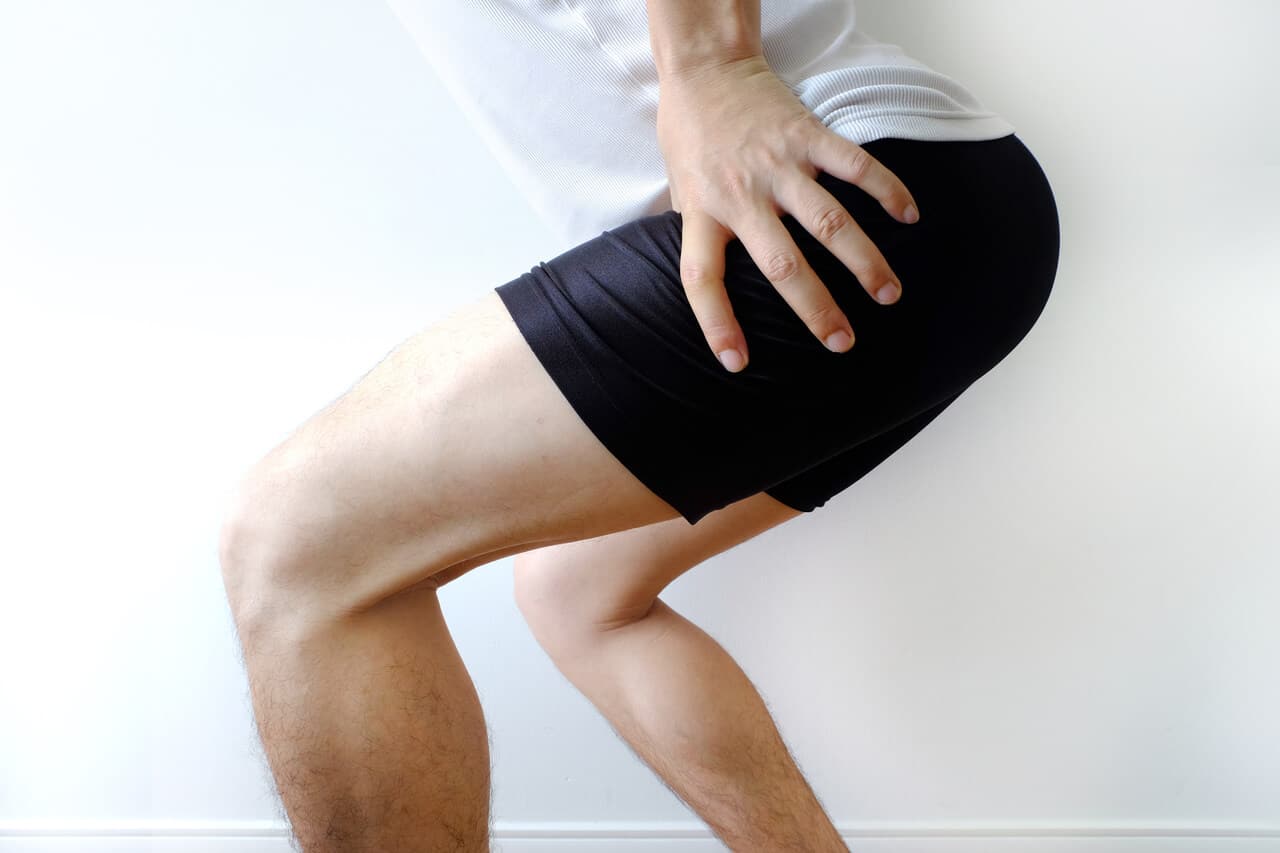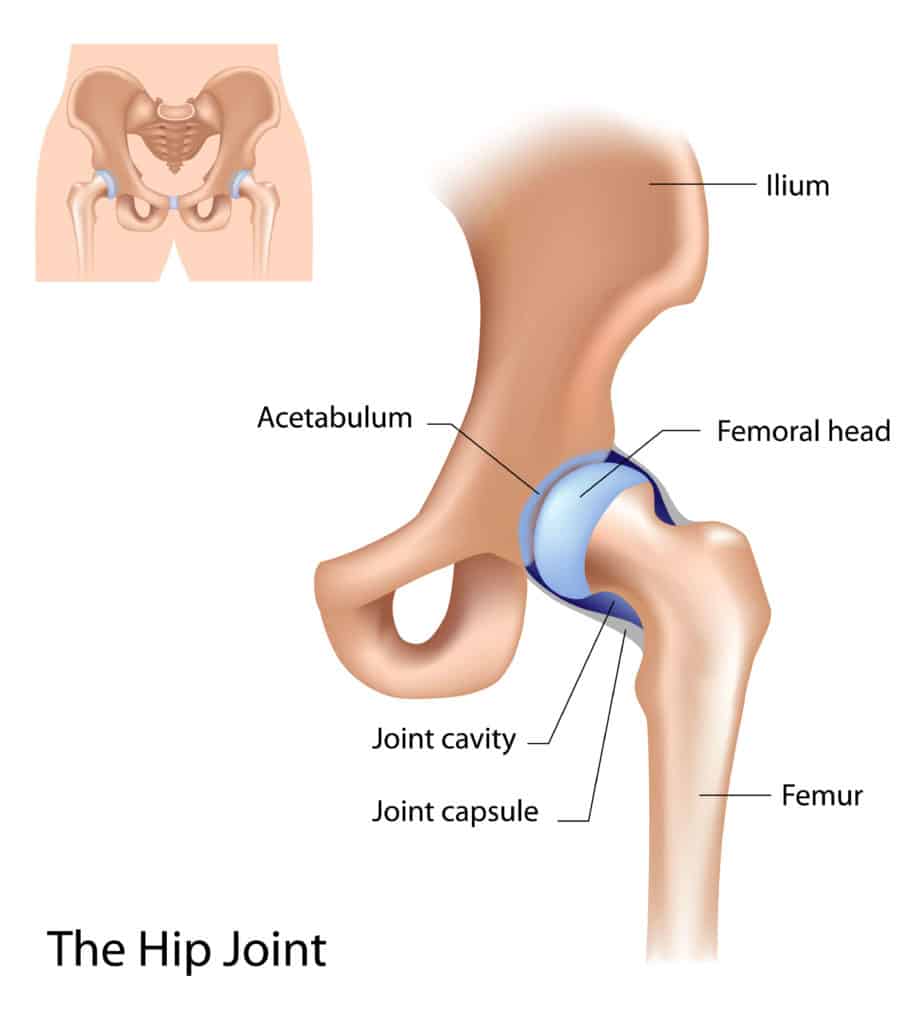The hip joint is located where the thigh bone (femur) meets the pelvic bone. It is a “ball and socket” joint. The upper end of the femur is formed into a round ball (the “head” of the femur). A cavity in the pelvic bone forms the socket (acetabulum). The ball is normally held in the socket by very powerful ligaments that form a complete sleeve around the joint (the joint capsule). The capsule has a delicate lining (the synovium).

Symptoms of Hip Disease
The most prominent symptom of hip arthritis is pain. Most patients think that their hip is in the region of the buttocks and are surprised to learn that true hip pain is most commonly experienced in the groin. Groin pain of hip arthritis is sometimes misdiagnosed at first as a hernia or a “groin pull.” The pain can radiate down the front of the thigh for a few inches as well. Occasionally, it goes all the way down the thigh to the knee (“referral pain”). This is because the hip and knee have an overlapping nerve supply. In fact, in some patients with hip disease, knee pain may be the only symptom.
Back pain is even more frequently confused with hip pain. Pain in the buttocks, across the low back, and down the back of the thigh, usually comes from the spine. It usually indicates a pinched nerve in the lower spine. Patients with a pinched nerve will also often have numbness or tingling in the leg. To complicate matters, some patients with an arthritic hip may also have a pinched nerve from a back disorder. It is important in such cases to determine which problem is causing most of the pain: the hip or the back. If your problem is mainly in your back, you may still be left with most of your pain after going through a hip replacement, and you will not be very happy with the result. If most of your pain is from the hip, a hip replacement may have the added benefit of improving your back condition as well, since the stiffness of an arthritic hip can aggravate a back problem.
Most patients with significant hip disease have a limp and one leg may feel shorter than the other. Bone-on-bone contact occasionally causes the patient to feel or hear the hip creaking during walking. As the disease progresses, the hip becomes stiff and less movement is possible. This may make it difficult for you to clip your toenails or to tie your shoelaces, and may also limit your ability to spread your legs. Quite often the first step or two after prolonged sitting may be especially painful. Eventually, you may have to take a break to ease the pain after walking only short distances. The distance you can walk will gradually decrease until you can only take one or two steps at a time.
The three common causes of pain around the hip are arthritis, bursitis, or a pinched nerve in the lower back (the most common cause). The groin pain of hip arthritis is sometimes misdiagnosed at first as a hernia.

Surgical Treatments
Hip Arthroscopy
Hip arthroscopy is a surgical procedure recommended for patients whose hip pain and function do not resolve with nonsurgical treatment, such as rest, medication, and physical therapy. It is a minimally invasive surgical procedure that is used to treat a variety of hip injuries and conditions, including labral tears, hip impingement, synovitis, bursitis, and snapping hip syndrome. Because hip arthroscopy is less invasive than open surgery, recovery time is quicker.
Hip Replacement
If arthritis pain has limited your mobility and your pain has not improved with nonsurgical treatment options, hip replacement surgery may be an option for you. At Summit Orthopaedics, our board-certified orthopedic surgeon, Dr. Amer Mirza, performs hip replacements on a weekly basis, if not more often. Dr. Mirza offers the latest advances in hip replacement surgery to ensure that you achieve the best results possible from your surgery, including greater mobility and improved quality of life. Learn More »
Hip Revision
If you have had a hip replacement and have experienced problems with it, you may be a candidate for hip revision surgery. Initial hip replacements are very successful for the vast majority of patients and provide lasting pain relief for many years. However, some patients may need a second hip replacement procedure due to infection, implant wear, or injury. This second procedure is called hip revision surgery or revision total hip replacement. Learn More »
Non-Surgical Treatments
If you have hip arthritis, the more you walk, the more the hip will hurt. In time, running, tennis, golf and eventually even walking may become impossible. You can minimize the pain by simply cutting back on activities that seem to aggravate the hip. Whenever possible, use an elevator (or an escalator) instead of stairs, and avoid long walks that leave you in pain. However, “saving the joint” by becoming totally sedentary will not slow down arthritis. Being totally sedentary leads to a loss of muscle and bone strength. Therefore it is recommended that you remain as active as your pain will comfortably allow.
Recommended Exercises
Swimming is a good exercise to relieve the stress on your hip. Bicycling (stationary or mobile) is also well tolerated. If you don’t have access to a pool or bicycle, try walking for as much as you can without causing yourself excessive pain.
Using a Cane
When you buy a cane from a medical supply company, make sure it is adjusted for you to the correct height. When using it, hold the cane in the opposite hand from the side with the hip problem.
Losing Weight
If you are greatly overweight, losing weight will probably decrease your pain, as one pound of weight loss equals 3 pounds in stress reduction on the hip during normal gait.
Cortisone Injections
A cortisone injection into the hip joint can provide pain relief for 6 months or so. A long needle is used with x-ray guidance to reach the deep hip joint. These injections are often recommended as treatment for hip arthritis and hip bursitis.
Non-Steroidal Anti-Inflammatory Drugs (NSAIDs)
NSAIDs are effective in decreasing the inflammation (pain and swelling) in arthritic joints. There are many NSAIDs available on the market, and you may have to try several before you find the one that is right for you. NSAIDs are only available by prescription and should only be taken under medical supervision.
Hip Pain Treatment in Portland, Oregon
Our board-certified surgeons at Summit Orthopaedics are here to help with your hip pain. Call us at 503-850-9940 to schedule a consultation.

